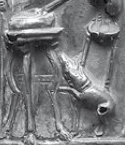Thoughts On Principal Doctrine Three And The “Limit of Pleaure”
 A recent Facebook post from a strong fan of Epicurus has me thinking that the epistemological perspective is the best way of understanding the reference in PD3 to the “limit of pleasure,” which can otherwise seem fairly obscure (at least to me!): “PD3. The magnitude of pleasure reaches its limit in the removal of all pain. When such pleasure is present, so long as it is uninterrupted, there is no pain either of body or of mind or of both together.” (Epicurus.net)
A recent Facebook post from a strong fan of Epicurus has me thinking that the epistemological perspective is the best way of understanding the reference in PD3 to the “limit of pleasure,” which can otherwise seem fairly obscure (at least to me!): “PD3. The magnitude of pleasure reaches its limit in the removal of all pain. When such pleasure is present, so long as it is uninterrupted, there is no pain either of body or of mind or of both together.” (Epicurus.net)
Diogenes Laertius’ biography of Epicurus indicates that Epicurus viewed Pleasure as one of his three co-equal legs of the Canon of Truth. Thus as an epistemological tool Pleasure (and Anticipations as well) is a “sense” parallel to sight or sound or any of other “five senses.’ We can use this parallel to decode PD3 by substituting another sense in the same phrase, for example: “The magnitude of sight reaches its limit in the removal of all darkness. When such brightness is present, so long as it is uninterrupted, there is no darkness of body or mind or of both together.” This would mean that when our eyes are overwhelmed by a strong and pure brightness (such as by looking at the sun) we can no longer perceive any variation in the brightness at all, and at that point our sight has reached its upper limit. In turn, the lower limit of sight would be the state of complete darkness where we can perceive no brightness at all outlining any object, and thus we perceive only total blackness.
Or another example: “The magnitude of hearing reaches its limit in the removal of all silence. When such loudness is present, so long as it is uninterrupted, there is no silence of body or mind or of both together.” This would mean that when our ears are overwhelmed by such a loud sound (such as standing near a rocket at lift-off) we can no longer perceive any variation in sound at all, and our hearing has reached its upper limit. In turn, the lower limit of hearing would be state of complete silence where we can perceive no sound at all, and thus we perceive only total silence.
Viewed in this way, it can be seen that PD3 is not a pronouncement that there is some kind of otherworldly state of “greatest pleasure” that equates with ‘absence of pain,” as we might think if we are under the influence of Platonist or religious views. Thus it would be a great error to think that Epicurus was speaking of an “otherworldly” state that we should seek to reach by suppressing our feelings in a Stoic or “Eastern” manner. Yes, Pleasure has an “evaluative” aspect that conveys to us immediately whether a thing is pleasing to us or painful to us, but the manner in which it performs this function is a “sense” – an epistemological tool just like seeing or hearing. It is not in itself a “final destination” any more than a particular sight or sound or smell should be considered a final destination or “end.”
If this view is correct, there are important implications. No matter who we are or what our circumstances, we all live our lives experiencing pleasure on a scale that varies as we go about our everyday living, but never leaves us completely until death, just in the same way that our eyes constantly experience sight while they are open and our ears constantly experience sound while we are awake. Thus “Pleasure” is best seen as the state in which Nature created us to live. Our experience of Pleasure should be with us constantly, just as it is our natural state for our eyes to see and our hears to hear. Viewed in this way Pleasure is emphatically not a “sin” or a “weakness” or an obstacle to proper living, any more than sight or hearing are themselves obstacles to proper living.
And one more implication: those philosophies and religions which condemn Pleasure are as contrary to Nature – as EVIL — as if they condemned the sense of sight or hearing – which they often do!

